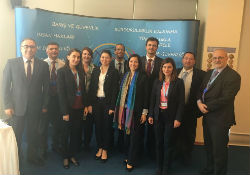Turkey accelerates its whole-of-government and whole-of-society response to noncommunicable diseases

WHO
The United Nations Interagency Task Force on the Prevention and Control of Noncommunicable Diseases (NCDs) was in Turkey from 20 to 22 April 2016 to support the Government of Turkey to meet its NCD-related Sustainable Development Goal targets. These targets are included in the 2030 Agenda for Sustainable Development, and in national development plans and policies.
WHO led the meetings, which included representatives of the:
- Food and Agriculture Organization of the United Nations
- International Labour Office
- United Nations Children's Fund
- United Nations Development Programme (UNDP)
- United Nations Population Fund.
United Nations representatives met with the ministries of health, economy, family and social policies, education, and youth and sport.
In addition, the Chairman of the Health, Family, Labour and Social Affairs Commission of the Grand National Assembly of Turkey, Professor Dr Vural Kavuncu, discussed upcoming legislative work on NCDs. A series of meetings were also conducted with representatives of civil society, including nongovernmental organizations, and professional and academic associations, to further develop intersectoral collaboration.
NCDs cause 86% of deaths in Turkey
NCDs – principally cardiovascular diseases, diabetes, cancers and chronic respiratory diseases – cause 86% of all deaths in Turkey. The probability of dying prematurely (i.e. before the age of 70 years) from NCDs in Turkey is 18%, which means that nearly 1 in every 5 adults dies before they should.
"I invited the United Nations Task Force to Turkey, because I want to ensure that we have a whole-of-government and whole-of-society response to NCDs. The epidemic of NCDs is now one of our biggest socioeconomic issues," said Dr Mehmet Müezzinoğlu, Minister of Health of Turkey. "We simply cannot afford the costs of people becoming ill from NCDs at such a young age," he added.
80% of premature deaths preventable
Dr Pavel Ursu, WHO Representative to Turkey said, "We are committed to support the Government to put NCDs at the forefront of the national development agenda. We are working together to tackle some of the key causes of NCDs, such as smoking, where nearly 1 in 3 men smoke and levels of salt intake are 3 times higher than WHO recommendations." He emphasized, "Every second death in Turkey is from cardiovascular disease, and 80% of these premature deaths can be prevented."
Multisectoral action to achieve NCD targets and socioeconomic potential
"A multisectoral action requires whole-of-government and whole-of-society approaches," said Dr Gauden Galea, Director of the Division of NCDs and Promoting Health through the Life-course at WHO/Europe. "If Turkey is going to tackle tobacco use, and a diet that is high in salt, sugar and saturated fat, as well as physical inactivity, then ministries must come together and engage to ensure policy coherence and mutual accountability of different spheres of policy making that have a bearing on NCDs," he added.
Dr Nick Banatvala, Senior Adviser to the Assistant Director-General, NCDs and Mental Health at WHO headquarters, was optimistic that Turkey could rise to the challenge on NCDs. "The Task Force believes that by 2018, when Turkey along with other countries has to report on progress to the United Nations General Assembly, more of these targets can be fully achieved," said Dr Banatvala. According to the WHO "NCDs progress monitor 2015", Turkey had fully met a number of the specific targets on national NCD action plans.
Mr Kamal Malhotra, United Nations Resident Coordinator and UNDP Resident Representative to Turkey, highlighted that tackling NCDs was crucial for sustainable development and for ensuring that Turkey would reach its full socioeconomic potential. "I am committed to ensuring that the United Nations country team in Turkey supports the Government in its multisectoral response to NCDs," Mr Malhotra highlighted.
Representatives of the Task Force and the Ministry of Health held a press conference on 22 April to share their observations. They indicated that they were informed about significant progress in scaling up action for NCDs in primary care, particularly in the detection and management of cardiovascular diseases and diabetes. They would also provide recommendations to tackle NCDs in Turkey.
About the United Nations Interagency Task Force on the Prevention and Control of NCDs
The Task Force was established by the United Nations Secretary-General in 2013 at the request of the UN Economic and Social Council to provide technical support to governments in tackling NCDs. It conducts assessments in countries throughout the world, and Turkey is the third country to receive an assessment in Europe.
NCDs are now a central part to the international agenda since the United Nations General Assembly agreed upon the Sustainable Development Goals in New York in 2015. The United Nations and WHO has a set of blueprints for action which, if implemented, will reduce premature mortality for NCDs in all countries. These include the WHO Framework Convention for Tobacco Control that Turkey ratified in 2004 and the WHO "Global action plan for the prevention and control of NCDs, 2013–2020".



